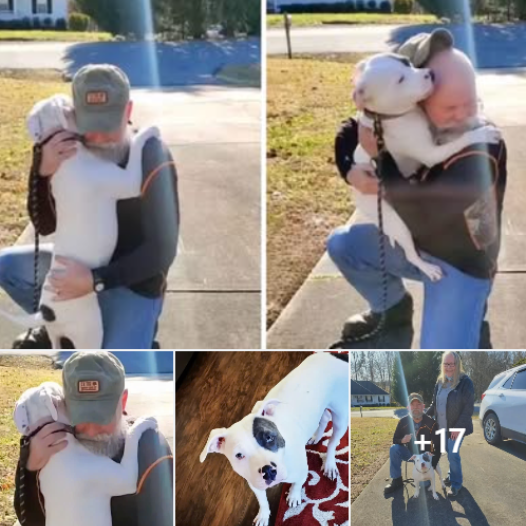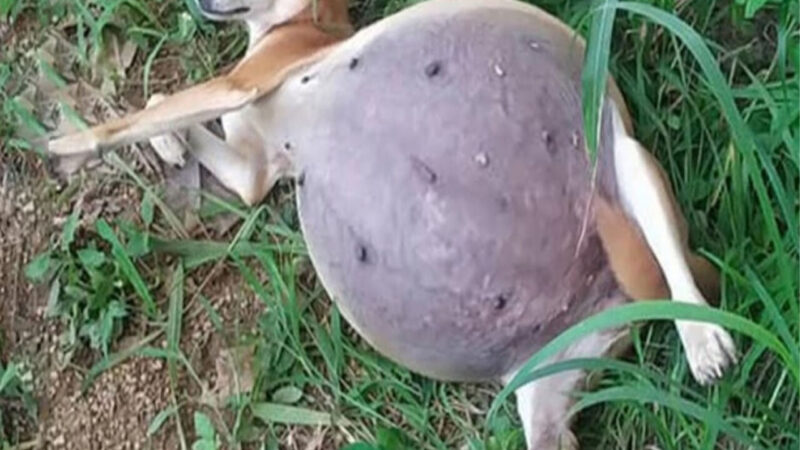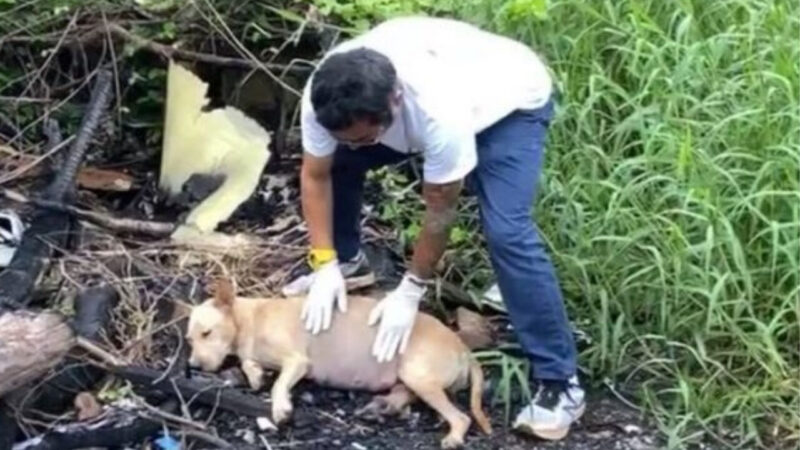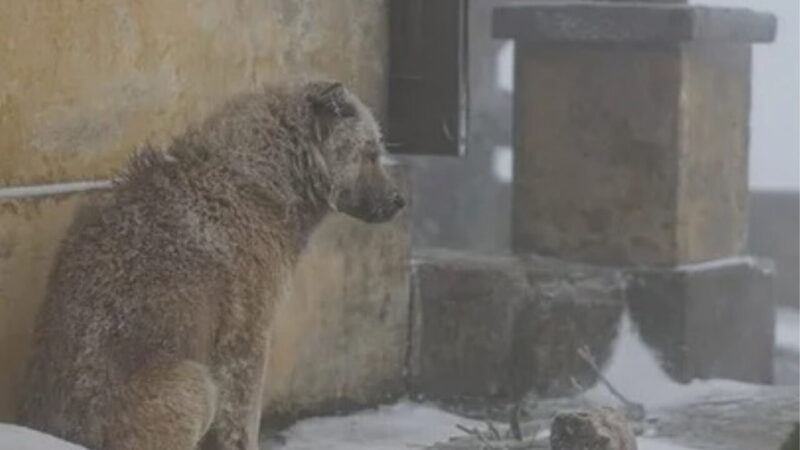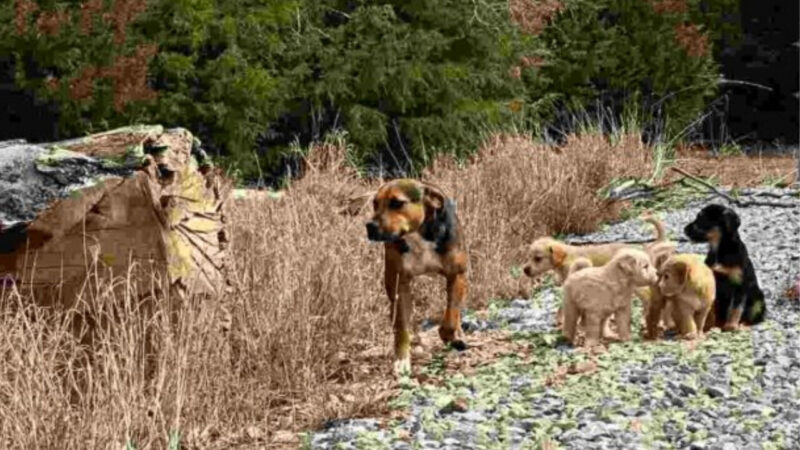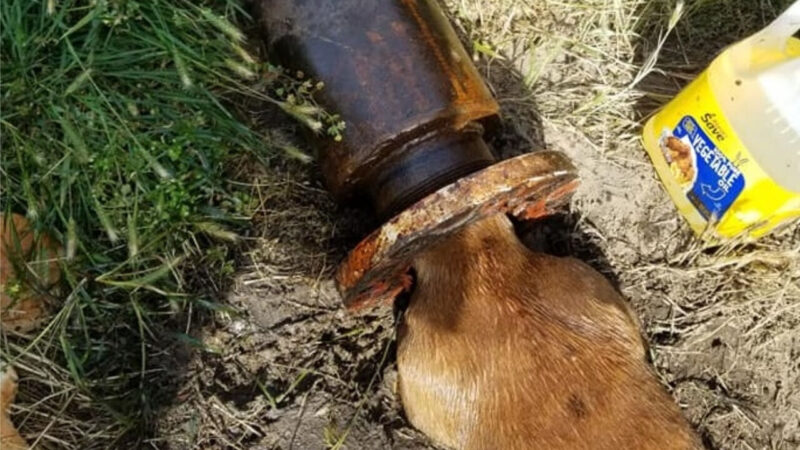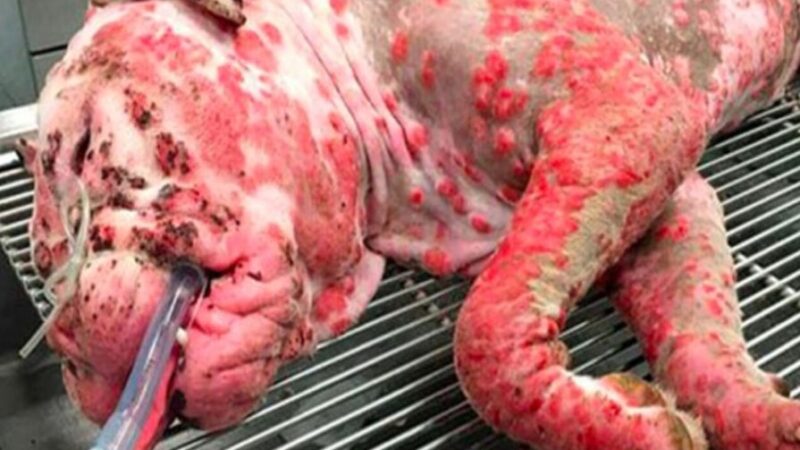A Rescue Dog Meets Her New Human Dad And Can’t Stop Hugging Him
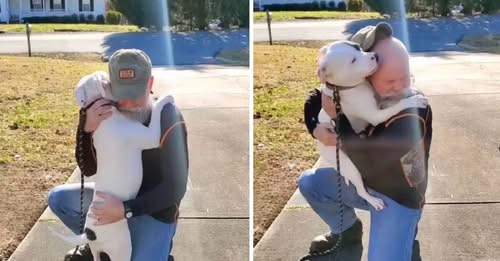
Losing a beloved dog is one of life’s most heart-wrenching experiences. It leaves a void that words can hardly describe—a hollow space in the heart that only those who have truly loved an animal can understand. There’s no way to prepare for the loss. Even when you know it’s coming, it still shatters you. You find yourself constantly thinking about whether you did enough, whether your dog knew just how much they were loved, and whether you could have given them a better life. The pain is sharp, unrelenting, and strangely quiet, settling into every corner of your daily life.
This was exactly the emotional state that Mary and Mark McCraw found themselves in after their sweet dog, Mishka, lost her battle with cancer. Mishka had been a faithful companion, a family member, and a source of unconditional love for years. Her absence was felt in the silent corners of the house, in the quiet moments after dinner, and in the routine that now felt so painfully incomplete.
The McCraws grieved deeply. Their home, once filled with the joyful noise of a dog’s presence—paws on the floor, a tail thumping against furniture, the soft rhythm of peaceful snores—was now heartbreakingly quiet. They weren’t sure they were ready to welcome another dog. They were still in mourning, still trying to understand how to live without the furry friend who had meant so much to them.
But as life often works in mysterious and beautiful ways, something unexpected happened. In the midst of their sorrow, Maggie came into their lives.
Maggie was a rescue dog. Her past was a difficult one. She had been used by her previous owners solely for breeding purposes. Her days were filled with neglect, and her existence had been reduced to reproduction. Once her body was no longer of use to them, she was discarded like something replaceable. Her spirit was broken, her trust in humans almost completely gone.
Thankfully, Maggie was rescued and placed in foster care with a kind woman named Andra Mac. Andra took care of Maggie during a crucial period of healing. In her care, Maggie slowly started to learn that not all humans were cruel. She began to trust again. She began to feel the warmth of a gentle touch, the security of a kind word, and the promise of a better life. Andra described her as one of the sweetest dogs she had ever fostered.
“She had a softness to her,” Andra recalled. “Despite everything she’d been through, she still had this gentle, loving soul. She didn’t give up on love.”
Halfway There Rescue, the organization that had helped Maggie on her journey, believed she was finally ready for her forever home. They arranged a meeting with the McCraw family in South Carolina. It was meant to be just a casual meet-and-greet. Mary and Mark weren’t sure if they were emotionally ready for another dog. Their hearts were still raw, still healing.
“I honestly didn’t think I could do it,” Mary admitted. “I thought I was going to meet her just to see, just to feel it out. I didn’t expect to feel anything strong.”
But the moment they saw Maggie, everything changed.
Maggie approached them with hesitant curiosity, her eyes wide and cautious. But then something incredible happened. As soon as she got close to Mark, she pressed herself into him—giving him the kind of deep, lingering hug that dogs somehow know how to give when they understand exactly what someone needs. She stayed in his arms, as if to say, “Thank you. I’ve been waiting for you.”
“I melted,” Mark said. “It was like she chose us. Like she knew we were meant to be together. She didn’t want to leave my side.”
Mary felt it too. In that instant, she knew that Maggie was not just any dog. She was a bridge between the love they had lost and the love they still had to give. She wasn’t replacing Mishka. She was continuing the legacy of love that Mishka had started. In Maggie, they found a new reason to hope, to smile, and to open their hearts again.
Even Andra, who had seen many adoptions, was moved by the moment.
“My husband and I looked at each other when Maggie hugged Mark, and we just knew,” she said. “It was something out of a movie. Like fate had intervened. Like it was written in the stars.”
The video of their first meeting, later shared by the rescue group, showed a ray of sunlight falling softly on them—illuminating the space as if someone above was smiling down. Andra, moved by the beauty of the moment, believed it was a sign.
“I like to think it was Mishka,” she said. “Watching from the other side. Giving her blessing.”
From that day forward, Maggie became a part of the McCraw family. The transition was seamless. It was as if she had always belonged there. She followed Mark everywhere, always by his side. She seemed to understand their rhythm, their routine, their hearts.
“She’s helped us heal,” Mary said. “She brought laughter back into our home. She brought peace.”
Maggie, in return, was finally getting the life she deserved. A life filled with love, comfort, and respect. No longer was she just a means to an end. She was a cherished member of a family—a soul with her own story, finally being honored and protected.
The story of Maggie and the McCraw family is a beautiful reminder of how healing can come from the most unexpected places. In their darkest hour, just when they thought their hearts couldn’t love again, a little dog with a broken past came and showed them that they could.
Grief never truly leaves us, but love has a way of growing around it. Maggie didn’t erase the memory of Mishka. She honored it. She carried the light that Mishka had left behind and helped it shine again in their lives.
For every dog that’s lost, there are others out there waiting—dogs who need a second chance, who are searching for their own forever homes. And for every grieving family, there is hope. Sometimes it comes with four legs and a wagging tail.
Thanks to kind-hearted rescuers like Andra, organizations like Halfway There Rescue, and families like the McCraws, dogs like Maggie get that chance. And families shattered by grief find a new beginning.
Love, after all, never dies. It simply takes a new form.
